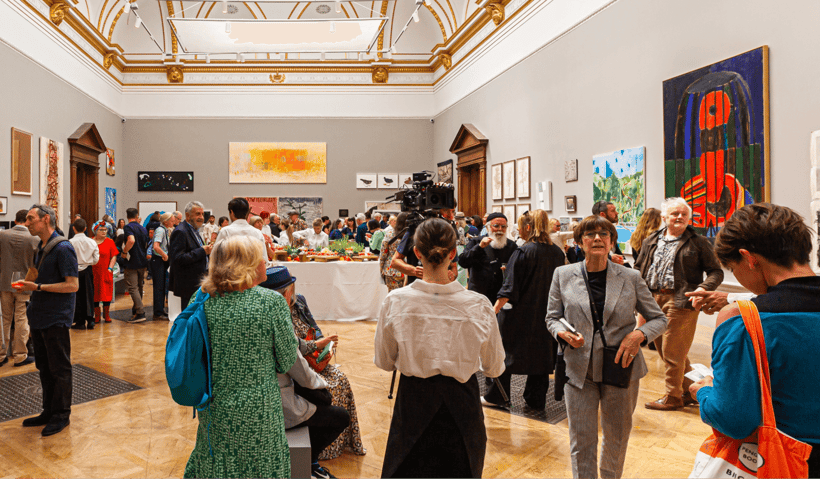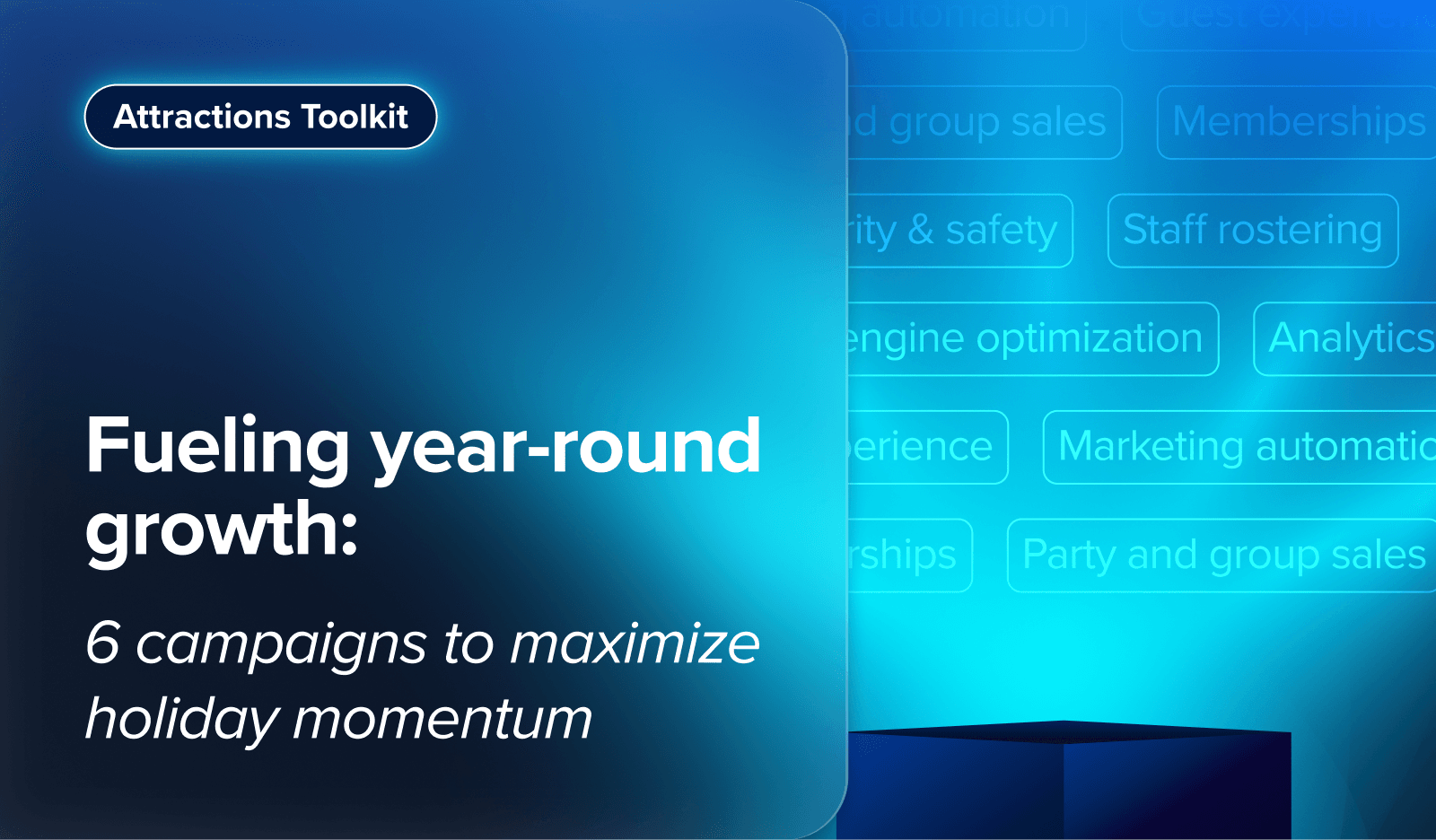How to Promote Events That Sell Out: Proven Event Marketing Strategies for Attractions Venues

When you're planning an event at your attraction venue, there's nothing better than seeing it completely sell out. But making that happen takes more than just putting up a flyer and hoping for the best. Successful event marketing requires a thoughtful mix of strategy, timing, creativity, and technology.
Whether you're promoting a seasonal festival, themed party, member-exclusive night, or holiday celebration, this guide will help you create an event marketing plan that drives attendance and boosts revenue.
What is event marketing?
Event marketing is the practice of promoting your event to a targeted audience using a variety of platforms and tactics—like email, social media, digital ads, and in-venue signage—to build awareness, drive interest, and ultimately sell tickets. It’s about getting the right message in front of the right people at the right time to inspire action.
Event marketing for attractions
If you run a family entertainment center, zoo, trampoline park, museum, aquarium, or similar attraction, your event marketing strategy needs to reflect the unique nature of your business.
Here’s why event marketing for attractions is different:
- Shorter lead times: Many attractions promote events with just a few weeks’ notice. That means your marketing needs to generate momentum fast, without weeks of prep time.
- Targeted guest segments: You might be targeting very specific groups—like parents with young kids, teens looking for weekend plans, or school groups booking a weekday field trip. Each audience requires a different tone, value proposition, and timing.
- Seasonality matters: Events are often used to drive attendance during slow periods or shoulder seasons. Planning an event that draws traffic on a rainy Tuesday afternoon is a different challenge than promoting a Halloween bash.
- Lean teams and limited budgets: Attraction operators often juggle multiple roles and responsibilities. Your event marketing plan needs to be efficient, scalable, and manageable—especially if you don’t have a large marketing team.
And most importantly, your events are part of a larger guest experience; they aren’t stand-alone functions. They complement your existing offerings, reinforce your brand, and help deepen relationships with guests.
That’s why successful event marketing in this space focuses on:
- Creating experiences that align with your brand and venue layout
- Attracting both new and repeat guests
- Maximizing per-capita spend through upsells and bundles
- Building a buzz that lasts well beyond the day of the event
At the end of the day, events are one of the most powerful tools you have to stay top-of-mind, generate loyalty, and drive incremental revenue—especially when paired with the right marketing approach.
Building an event marketing plan
Behind every sold-out event is a smart, intentional plan. A solid event marketing plan helps you stay organized, hit your goals, and connect with the right audience at the right time. For attractions venues, this is especially important—because your team is likely juggling multiple priorities at once, and your guests often need a strong reason to commit in advance.
Here’s how to build an effective plan that sets your event up for success:
1. Set your goals
Start by defining what success looks like. Are you aiming to:
- Sell a specific number of tickets?
- Drive foot traffic during off-peak hours?
- Promote a new attraction or themed space?
- Re-engage members or previous guests?
Be as specific as possible. Clear goals will guide your messaging, targeting, and promotional tactics—and help you evaluate whether your campaign was effective.
2. Know your audience
Understanding your audience is critical to crafting a message that resonates. Who are you trying to reach?
For example, families with young children might respond well to themed characters, bundles, or early time slots. Teens, on the other hand, might be more excited about after-dark events, competitions, or influencer partnerships. Corporate groups might look for team-building activities or private bookings.
The more clearly you define your audience, the easier it will be to select the right marketing channels, language, and offers.
3. Map your timeline
Great marketing is all about timing. Outline a promotional timeline that includes:
- Pre-launch: Build excitement before tickets go on sale with sneak peeks or “save the date” posts.
- Launch phase: This is your main push to drive bookings. Emphasize urgency (limited spots, early bird pricing, etc.).
- Last-minute reminders: Many people wait until the final days to book. Send countdown emails or post “almost sold out” alerts on social media.
A clear timeline ensures your audience sees the right message at the right stage of the campaign.
4. Select your channels
Choose a mix of digital and in-venue channels to reach your audience wherever they are.
- Digital channels: Email, SMS, social media, your website, and digital ads.
- In-venue promotion: Posters, digital signage, staff mentions at checkout, or flyers in take-home materials.
Using multiple touchpoints increases the chances that your guests will notice, remember, and act on your promotion.
5. Craft compelling messaging
Your messaging should answer the guest’s biggest question: Why should I care?
Highlight what makes your event unique. For example, is it exclusive or one-time only? Are there special guests, themes, or limited-edition perks? Will there be discounts, free gifts, or family bundles?
Use clear calls to action like “Book Now,” “Spots Are Filling Fast,” or “Join the Fun This Weekend” to drive clicks and conversions.
6. Track and analyze performance
Once your campaign is live, don’t set it and forget it. Monitor key metrics like:
- Email open and click-through rates
- Ticket sales and conversion rates
- Ad performance and website traffic
- On-site engagement or POS upsells
After the event, review what worked (and what didn’t) so you can refine your strategy for next time.
Read more: Unlocking the Power of Analytics: How to Leverage Data for Marketing
Promoting your event: tactics that work
Once your plan is in place, it’s time to bring it to life. Here’s how to market your event using a smart mix of digital and on-site strategies.
Digital strategies:
- Email and SMS marketing: Target past visitors, members, or local families with timely messages. Include early-bird deals, limited spots, or exclusive access.
- Social media content: Use countdowns, behind-the-scenes reels, teaser clips, contests, and influencer shoutouts to build excitement.
- Website updates: Add homepage banners or pop-ups promoting the event. Use strong calls-to-action like “Book Now” or “Only 10 tickets left!”
- Paid ads: Use Facebook, Instagram, or Google ads to reach nearby guests. Retarget website visitors or previous buyers for best results.
Read more: Email Marketing Best Practices for Venue Operators
On-site strategies:
- Signage: Posters, digital screens, and table tents near check-in or exits catch attention.
- Staff-led promotions: Train staff to mention the event during check-in, check-out, or while serving guests.
- Take-home materials: Include flyers or QR codes in birthday party bags, membership welcome kits, or group visit packets.
How to increase event attendance without a huge budget
You don’t need a massive marketing budget to boost attendance. Here are some high-impact, low-cost strategies:
- Offer early bird discounts or limited-time deals
- Use referral programs that reward guests for inviting friends
- Promote your event in community groups on Facebook or local newsletters
- Partner with local schools, hotels, or kids clubs for group bookings
- Share photos or video clips from past events to create social proof
- Highlight what's new, exclusive, or only available for a limited time
Even simple ideas like giving attendees a bonus for booking early (e.g., free drink, priority check-in, event wristband) can help drive urgency and increase conversions.
Read more: Hacking the Marketing Budget: Amplify Your Reach Without Breaking the Bank
Measuring event marketing success
To know if your event marketing strategy is working, you need to track key performance indicators (KPIs). Here are the most important ones:
- Total ticket sales and revenue
- Website conversion rate (event page views to ticket purchases)
- Click-through rate for email or SMS campaigns
- Social media engagement (likes, shares, comments, saves)
- Redemption rate for discount codes or promo links
- Guest satisfaction scores or post-event reviews
Conclusion
Great events don’t sell themselves. Behind every packed house or sold-out session is a well-planned, multi-touch marketing strategy that brings the right people in at the right time.
If you’re wondering how to market an event more effectively, start by clarifying your goal, leveraging guest data, and using tools that make promotion seamless. With the right systems in place, your next event won’t just attract a crowd—it’ll create loyal fans who can’t wait to come back.
Ready to boost attendance and revenue? Book a demo to see how ROLLER can help your venue thrive.
Frequently asked questions about event marketing for attractions
What is event marketing?
How do you market an event effectively?
What is the best way to promote an event?
How do you get people to attend your event?
How do you create an event marketing plan?
How can I increase attendance at my venue’s events?
How do I measure the success of an event marketing campaign?
Related articles
.png)

Attractions Toolkit: 6 Marketing Automation Campaigns to Maximize Holiday Momentum
.jpg)
Enhance your guest experience
Get free education, tips and inspiration to help you run a successful venue.

